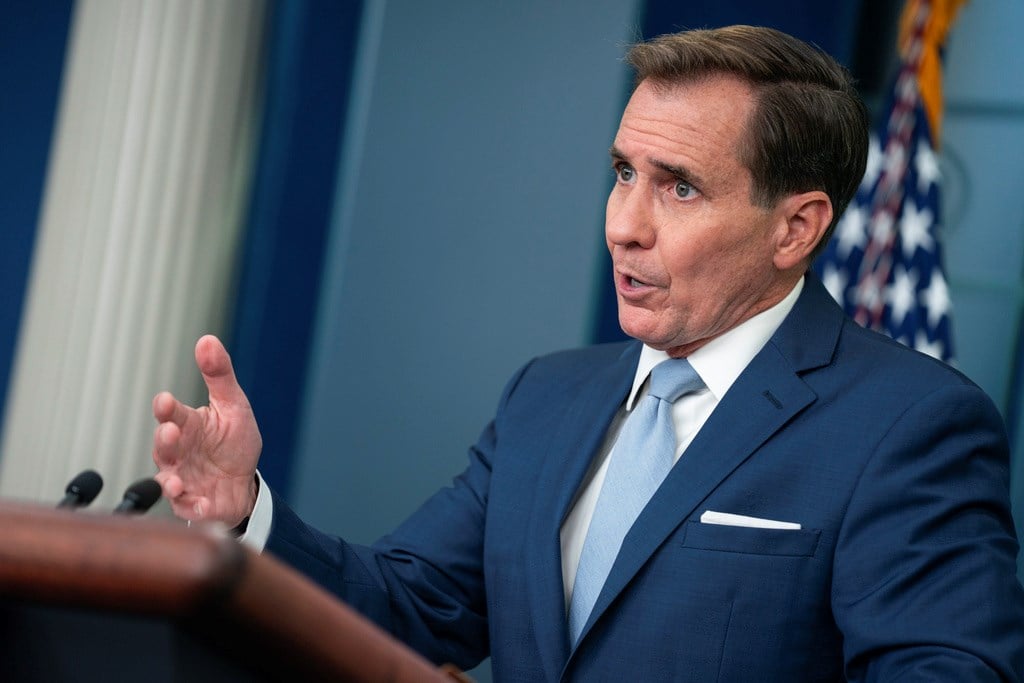US restrictions not sign of deteriorating China-US relations: Kirby
White House National Security Council spokesperson John Kirby claims the US decision to restrict or prohibit US investment in certain industries in China is a matter of national security, Beijing disagrees.
-

National Security Council spokesman John Kirby speaks during a press briefing at the White House, Wednesday, July 26, 2023, in Washington (AP Photo/Evan Vucci)
White House National Security Council spokesperson John Kirby claimed, on Friday, that the US restrictions on US investment in China are not a sign of deteriorating relations between Washington and Beijing, however, the latter disagreed.
During a press briefing, Kirby said "I would like to push back a little bit on the premise of the question that we've sharpened our language or that we're executing some sort of turn in the relationship, and that is just not so," adding that "we have been very consistent about pushing back on China, in the region and beyond, rhetorically and tangibly where and when we believe it's in our best interest, in the interest of our allies and partners to do so."
Kirby also said that Washington sought to improve communication with Beijing, however, the Chinese Embassy spokesperson Liu Pengyu stated that Beijing is disappointed that the restrictions were imposed by the Biden administration.
"The latest investment restrictions will seriously undermine the interests of Chinese and American companies and investors, hinder the normal business cooperation between the two countries, and lower the confidence of the international community in the US business environment," Liu said.
Chinese MFA spokesperson: #China strongly deplores and firmly opposes the #US’s single-minded rollout of restrictions on investments in China. We have made serious démarche to the US and will resolutely safeguard our rights and interests. https://t.co/jDKhlcLT4S
— Liu Pengyu 刘鹏宇 (@SpoxCHNinUS) August 10, 2023
The usage of the national security argument by the US served to politicize and weaponize trade, scientific, and technological issues said the Chinese spokesperson reaffirming that the Us is deliberately creating obstacles with the purpose of creating a hindrance to the process of normalizing economic and trade exchanges including technological cooperation.
It is also worth noting that a senior US administration official announced that Biden's measures were deliberated thoughtfully and included consultations with allies and partners in the US Congress and stakeholders.
US executive order prohibits or restricts investment in Chinese tech
An executive order signed by US President Joe Biden on Wednesday is set to prohibit specific US investments in "sensitive technologies and products" in China.
In three industries—semiconductors and microelectronics, quantum information technology, and certain AI systems—the order empowers the US treasury secretary to prohibit or restrict some US investments in Chinese businesses.
The plan is aimed against investments in Chinese businesses producing chip-design software and manufacturing technologies. These sectors are primarily dominated by the US, Japan, and the Netherlands, but the Chinese government has been striving to develop domestic alternatives.
Although US officials said the limitations were designed to address "the most acute" national security risk factors and not to split the two nations' allegedly substantially interconnected economies, the new order may increase tensions between the world's two biggest economies.
According to Democratic Senate leader Chuck Schumer, "today the United States is taking a strategic first step to ensure American investment does not go to fund Chinese military advancement,” after claiming that “For too long, American money has helped fuel the Chinese military’s rise."
In turn, Republicans believed that Biden's order still did not go far enough. For example, House Foreign Affairs Committee chairman Michael McCaul said, “the failure to include existing technology investments as well as sectors like biotechnology and energy is concerning.”
Read mroe: China detains national suspected of spying for CIA

 3 Min Read
3 Min Read








